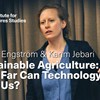substitutes

Karim Jebari & Emma Engström: Sustainable Agriculture - How Far Can Technology Take Us?
What would it take to have a sustainable world by the year 2100? In their research, philosopher Karim Jebari, and Emma Engström, PhD in technology, have analyzed a large set of potentially disruptive
Artificial intelligence and the changing sources of competitive advantage
Strategic Management Journal, 2022, 1-28 Abstract AI-based technologies increasingly substitute and complement humans in managerial tasks such as decision making. We investigate how such change affects
Future of food: A technology-centered path towards sustainable production in 2100
Futures, vol. 167 Abstract We stipulate a normatively desirable scenario for food production in 2100 and formulate a specific technology-centered path to reach it. In this scenario, the human population
Backcasting the Future of Food: A Technology-Oriented Path to Sustainable Production in 2100
Institute for Futures Studies Working Paper 2024:18 Abstract We stipulate a normatively desirable scenario for food production in 2100 and identify a technology-centered path to attain it. The target ou
Rainer Bauböck: Globalization, new technologies and the future of democratic citizenship
Professor of Social and Political Theory, European University Institute. ABSTRACT Liberal democratic citizenship has been shaped by the legacies of Athens (democracy) and Rome (legal rights) but operate between individuals and states. In a Westphalian world, citizenship has both instrumental and identity value. Enhanced opportunities and interests in mobility rights strengthen instrumental interests in multiple citizenship among immigrants, among populations in less developed countries, and among wealthy elites. The latter two trends potentially undermine a genuine link norm and, if they prevail, might replace the Westphalian allocation of citizenship with a global market. New digital technologies create a second challenge to Westphalian citizenship. As has argued, digital identities could provide a global legal persona for all human beings independently of their nationality, and blockchain technologies could enable the formation of non-territorial political communities providing governance services to their members independently of states. Both the instrumental uses of citizenship for geographic mobility and technologies that create substitutes for territorial citizenship are not merely relevant as current trends. They are also advocated and defended normatively as responses to the global injustice of the birthright lottery. I will challenge this idea and argue that liberal democracies should not be conceived as voluntary associations whose membership is freely chosen, but as communities of destiny among people who have been thrown together by history and their circumstances of life. How these foundations of democratic community can be maintained in the context of rising mobility and the digital revolution remains an open question.
Tackling toxins: Case studies of industrial pollutants and implications for climate policy
Regulation & Governance Abstract As scholars race to address the climate crisis, they have often treated the problem as sui generisand have only rarely sought to learn from prior efforts to make indu

Daniel Hausman: What is a Fair Allocation of Healthcare?
Research seminar with Daniel M. Hausman, Research Professor at Center for Population-Level Bioethics at Rutgers University. This seminar is arranged by the Institute for Futures Studies and Center for
More Than a Revolving Door: Corporate lobbying and the socialization of institutional carriers
Organization Studies, https://doi.org/10.1177/0170840619848014 Abstract In this paper, I study an epitomic case of institutional carriers of ideas: revolving door lobbyists. In a multi-directional interv
The Triviality Worry About Gender Terms and Epistemic Injustice
Social Epistemology Abstract According to contextualism, a gender term such as ‘woman’ does not invariantly refer to a specific social orbiological kind. Instead, gender terms have different extensions dincludingexcluding
Mike Otsuka: How to guard against the risk of living too long: the case for collective pensions
Mike (Michael) Otsuka, Professor of Philosophy at London School of Economics ABSTRACTIn this paper, I defend the realization here and now of a type of occupational pension that is collective rather tha








